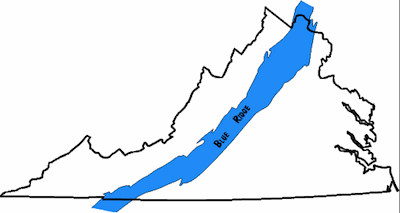We examined a song containing a blatant geographic inaccuracy in a recent article, “In Them Old Cotton Fields.” I left a hint for readers when I stated that I too took offense at a song with an equally irritating error, one having to do with the Mountain State. Many of you probably knew the answer immediately, but to clarify it’s “Take Me Home, Country Roads” performed John Denver. The offending lines:
Almost heaven, West Virginia
Blue Ridge Mountains, Shenandoah River
This song has become something of a cultural icon to the fine people of West Virginia. I love that state. I have no intentions of perpetuate common stereotypes because I know first-hand that those are demonstrably false. However, the Blue Ridge Mountains and the Shenandoah River do not generally represent the topography of West Virginia. Well, except in a most extreme literal sense. Widespread adoption of this song as an unofficial state anthem can be misconstrued as evidence, intentionally or otherwise, as a smear upon the West Virginia educational system. That’s a shame.
Let’s start with the Blue Ridge Mountains

This range stretches through several eastern states. It runs along the entire spine of neighboring Virginia and then barely straddles the farthest rim of the eastern panhandle of West Virginia. There, the border between the two states follows the ridgetop. At best, West Virginia’s share of the Blue Ridge Mountains includes half a ridge. It clips one edge of one single county of the state’s 55 counties.
A similar issue exists with the Shenandoah River
![No machine-readable author provided. Kmusser assumed (based on copyright claims). [CC BY-SA 2.5 (https://creativecommons.org/licenses/by-sa/2.5)]](https://upload.wikimedia.org/wikipedia/commons/4/4c/Shenandoah_watershed.png)
Nearly the entire Shenandoah River and its extended watershed remain within the confines of Virginia. A small portion crosses through West Virginia. Once again it hits at the extreme farthest edge of the Eastern Panhandle. There it empties into the Potomac River at Harpers Ferry.
Barely Accurate
Thus, except for a tiny strip of land about twenty miles long and two miles wide, the song is factually incorrect.
The West Virginia residents of this 40 square mile area can rightfully claim “Take Me Home, Country Roads” as their own. The inhabitants of the other 24,037 square miles, the remaining 99.83% of the state, are simply perpetuating a geographic inaccuracy. Whether the rest of the song applies, well, I’ll leave that up to them. I’m not sure a reference to moonshine creates the most positive image either but that’s not my call. Only the geography bothers me.
Within the Narrow Strip
It’s very pretty within the strip of land where the song applies legitimately. I’ve driven through it many times using Route 9 on the way to my beloved Loudoun County, on the Virginia side of the ridge. One might even claim with some visible evidence that it should qualify as almost heaven.
For the sake of accuracy to the remainder of the state however, perhaps the lyrics could be tweaked to better express features more commonly representative of West Virginia. Maybe it should be the Appalachian Mountains and Gauley River (home of some amazing whitewater rafting)? The order would have to be reversed to match the melody but it would fit.
Conspiracy
I’ve known people who grew up in Virginia’s Shenandoah Valley who swear to their belief in an improbable conspiracy theory, insisting that the song’s original wording had to have been “Western Virginia.” The song is so famous and the geography is so wrong that they try fervently to pull it back across the border and claim it as their own. I tend to discount conspiracy theories and this one seems to lack evidence even more than most. It’s wishful thinking. It also sounds terrible if one tries to sing it that way. No Virginia, the song belongs to your western neighbor.
According to the Wikipedia page on this subject, with all the usual caveats about the source’s veracity, the geography contained within its verses was a composite. Part of it was a tribute to a friend who extolled the virtues of the Mountain State. The country roads were inspired by a location in Maryland. The rest of the lyrics were simply a bunch of nostalgic tear-jerk phrases that sounded good when dropped into a melody.
Is it a wonder that I’m cynical?

Leave a Reply